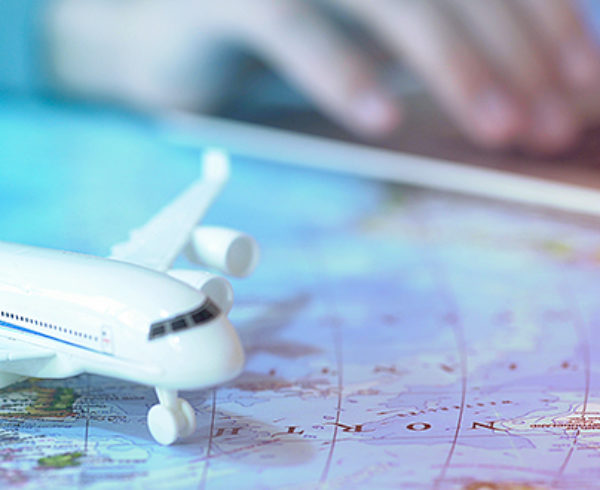When COVID-19 arrived and Travelers stopped flying, airlines dropped their change fee. But will airline change fees come back when the coronavirus goes away?
Travel was among the hardest hit industries when COVID-19 became a pandemic in spring 2020. Consumers cancelled vacations. Business Travelers were told to work from home. Passenger volume and airline revenue dropped precipitously.
Any business experiencing an existential threat is going to make adjustments aimed at attracting more customers. For the travel industry, that meant ditching something that’s long been aggravating for both leisure and business Travelers — the airline change fee.
There’s an under-the-radar reason why airlines have dropped their change fees. That reason is that airlines are helping their friends in the credit card industry.
The big three carriers in the United States (American, Delta and United) have all dropped change fees for domestic flights and for limited international destinations within North America. Is this a short-term change focused on stoking business during a downturn? Or is this the start of a new, customer-focused trend that will be with us for the long-term? Find answers to these questions, plus more about change fees in the age of COVID-19, below.
Encouraging Travel
Airline change fees are big business for airlines. In 2019 alone, American Airlines generated $800 million from change fees. That’s not revenue they would give up without good reason. And the pandemic has provided that good reason.
In August 2020, the TSA reported 800,000 passengers clearing security. Compare that figure to the 2.2 million travelers who passed through security lines during the same period in 2019. What’s scariest for airlines: August was actually an improvement over recent months.
The sudden drop in business has forced airlines to cut back on routes, layoff or furlough workers, and, in some cases, suspend operations entirely. To encourage leisure and business Travelers to continue booking flights, airlines collectively saw the elimination of change fees as one of their most effective tools.
Assisting Credit Card Networks
There’s an under-the-radar reason why airlines have dropped their change fees. That reason is that airlines are helping their friends in the credit card industry.
For years, airlines and credit cards have worked hand-in-hand to boost each other’s businesses. Partnerships emerged where holders of certain credit cards could earn points or miles that could be redeemed for flights on specific carriers. These partnerships allowed credit cards to motivate consumers to spend more, and they allowed airlines an effective new way to help sell out flights.
The credit card industry took a hit during the pandemic, too, just like the travel industry. In July 2020, outstanding credit card balances fell by $300 million. While credit card holders stayed home as the coronavirus spread, they stopped using their cards to eat out, pump gas and, yes, travel. Banks stopped offering credit cards to as many customers during the pandemic as underwriting became more rigorous. Many Americans also used stimulus checks provided via the CARES Act passed in March 2020 to pay down outstanding credit card balances.
The elimination of change fees applies to tickets redeemed through credit card reward programs. The hope of credit card companies is this: that the additional flexibility provided by the absence of change fees may inspire consumers to sign up for and use airline-related credit cards at something close to pre-pandemic levels.

Beware Loopholes
Before you assume a ticket is eligible for changes without a fee, you should know that loopholes exist. For example, change fees may still be charged in the following situations:
- Basic economy: If you hold a ticket in basic economy, a trendy new class of service, you will likely pay a change fee when adjusting your trip.
- International flights: Depending on the airline, you may not have to pay a change fee when adjusting travel to Mexico and destinations in the Caribbean. But changes to flights to other international destinations will come with a fee.
Keep in mind also that many airlines are now offering free changes. That does not mean they are offering free cancellations. You’ll eventually have to take that trip. Of course, if the pandemic continues, airlines are likely to stretch out the window of time within which you need to reschedule your trip.
The Future of Airline Change Fees
Here’s the real question: Are airline change fees gone long-term or only temporarily? Some airlines, such as united airlines, are claiming they will permanently eliminate change fees. The elimination of change fees was less an act of goodwill by airlines toward passengers and more a clear-eyed business decision designed to boost revenue during a crisis. Expect the absence of change fees to continue as long as airlines need help staying afloat.
The question then becomes: How long will it take airlines to fully recover from the pandemic-related downturn? Will it be 6 months? A year? Multiple years? Longer? No one knows for sure, but it seems likely that we will travel for leisure and business in a no-change fee world for the foreseeable future. If and when airlines reinstate change fees, see it as a sign that the airline industry and the economy overall have recovered from COVID-19.
Whether or not airlines reinstate change fees, you shouldn’t get nickeled and dimed by your travel management company. At JTB Business Travel, we moved to a no-transaction fee model long before COVID-19 arrived. This new model allows for a better partnership with less friction. If you need corporate travel support without excessive fees, our team is here for you.
Get Your Travel Program Flying Again
So many businesses that need to travel for business development, client relations, general operations and other reasons have been sidelined in 2020. If you’re looking for a safe, effective, affordable way to start flying again, JTB Business Travel is here to help.
As a comprehensive travel management company, we can help your company with all aspects of business travel. Behind every service we provide and every recommendation we make is a common-sense approach to business travel.
Contact us today to learn more about what we can do for your travel program.














Leave a Comment